|
|
|
Sort Order |
|
|
|
Items / Page
|
|
|
|
|
|
|
| Srl | Item |
| 1 |
ID:
167106


|
|
|
|
|
| Summary/Abstract |
Although the collective memory of war is frequently invoked in post-war societies, who chooses to invoke it and to what effect has been less studied relative to other aspects of such societies. In this article we employ a case study of Sierra Leone to address this deficit in the post-conflict scholarship by illustrating how the collective memory of that country’s civil war is appropriated by diverse actors in the post-war society. Drawing from field interviews, we present evidence showing how, and why, several societal groups constituted as distinct post-war identities such as victims-rights groups, former defenders of the state, or perpetrators of the violence during the Sierra Leone civil war articulate dissatisfactions with their livelihoods and the reactions of state officials to their demands. The article explains why, and how, successive governments have selectively suppressed the discontent of some groups over livelihood insecurities that are construed as threats to public order while ignoring violent protests from other groups over similar issues, in spite of a 1965 public order act restricting protests. Thus, the article argues that state officials in Sierra Leone have not demonstrated superior commitment to peacebuilding than societal groups that make demands on the state.
|
|
|
|
|
|
|
|
|
|
|
|
|
|
|
|
| 2 |
ID:
114997
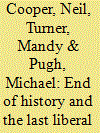

|
|
|
|
|
| Publication |
2011.
|
| Summary/Abstract |
In the April 2010 Review of International Studies, Roland Paris argued that liberal peacebuilding is the only viable solution for rebuilding war-torn societies, and supported this by assailing critics of the liberal peace. In this article we challenge four key claims made by Paris: imposed and consensual peacebuilding are different experiences; there are no echoes of imperialism in modern peacebuilding; there is no alternative to the capitalist free market; and critics of the liberal peace are 'closet liberals'. We argue that Paris ignores the extent to which all peacebuilding strategies have had a core of common prescriptions: neoliberal policies of open markets, privatisation and fiscal restraint, and governance policies focused on enhancing instruments of state coercion and 'capacity building' - policies that have proved remarkably resilient even while the democracy and human rights components of the liberal peace have been substantially downgraded. There is little space to (formally) dissent from these policy prescriptions - whether international peacebuilders were originally invited in or not. Furthermore, the deterministic assumption by Paris that 'there is no alternative' is unjustifiable. Rather than trying to imagine competing meta-alternatives to liberalism, it is more constructive to acknowledge and investigate the variety of political economies in post-conflict societies rather than measuring them against a liberal norm.
|
|
|
|
|
|
|
|
|
|
|
|
|
|
|
|
| 3 |
ID:
088378
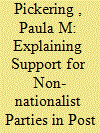

|
|
|
|
|
| Publication |
2009.
|
| Summary/Abstract |
Parties willing to engage in cross-ethnic political cooperation are essential for the stability and democracy of ethnically divided post-conflict states. The investigation of voting in Macedonia and Bosnia, which are similarly small, impoverished, ethnically fragmented and threatened states that arose out of Yugoslavia, helps uncover factors that encourage voters to support parties willing to engage in cooperative multiethnic governance. Analysis of survey data suggests that supporters of the non-nationalist challengers in the first post-violence elections expressed both strong positive associations with the past communist system and clear negative assessments of the governing record of the incumbent nationalists, sentiments that were stronger among Macedonians than among Bosniaks. Data, however, call into question popular contentions that voters' support for non-nationalists is rooted in their social tolerance or engagement in civil society. The finding that Macedonian support for non-nationalist parties is partly due to negative voting combines with difficult domestic social and economic conditions, unfriendly neighbours and uncertain regional integration processes to suggest continuing challenges for Macedonia.
|
|
|
|
|
|
|
|
|
|
|
|
|
|
|
|
| 4 |
ID:
116850
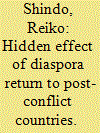

|
|
|
|
|
| Publication |
2012.
|
| Summary/Abstract |
In response to the paucity of human resources in post-conflict societies, various agencies have implemented programmes to facilitate returns of qualified diasporas to their countries of origin. This paper examines the context in which diaspora return programmes have emerged and developed, and implications of the return programmes for post-conflict societies. It specifically looks at Migration for Development in Africa (mida) using the example of Rwanda. The paper demonstrates that the prime purpose of diaspora return programmes is to mitigate the effect of brain drain caused by migration from the South to the North. Furthermore, the paper argues that a secondary purpose of the programmes can be to secure a chance of return for diasporas who would like to return to their countries of origin but would like to stay away from the politics of these countries. In conclusion, the author suggests that diaspora return may increase the multiplicity of voices available in countries that tightly control dissident voices.
|
|
|
|
|
|
|
|
|
|
|
|
|
|
|
|
| 5 |
ID:
139236
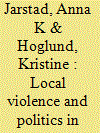

|
|
|
|
|
| Summary/Abstract |
This article analyses the narratives of survivors of violence in KwaZulu-Natal, South Africa, and addresses the relationship between local violence, politics and agency in a post-conflict setting. In particular, the study advances an understanding of how local political violence serves to increase or decrease agency. In line with previous research on emotions and agency, our study suggests that fear and anxiety encourage risk avoidance and have a pacifying effect on survivors of violence. It also indicates that anger and enthusiasm are emotions experienced by those who have a strong sense of agency and have become politically mobilised after violence. The study contributes to the debate on local capacity for peacebuilding and democracy by showing how local agency is affected by violence and how survivors of violence can become agents of change through politics.
|
|
|
|
|
|
|
|
|
|
|
|
|
|
|
|
| 6 |
ID:
109233
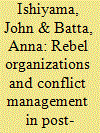

|
|
|
|
|
| Publication |
2011.
|
| Summary/Abstract |
How do the organizational features of rebel groups participating in civil wars affect the likelihood of the resumption of conflict after a civil war has ended? As many scholars have noted, peace duration is a function of the extent to which rebel groups stick to the deal. However, occasionally a rebel group fractures, and the conflict resumes as a result. Using a combination of existing data on civil conflicts and characteristics of the settlement agreement, along with original data on the characteristics of the insurgent organizations implementing the agreement, we test the effect of the organizational features of the rebel group on the duration of the peace settlements that occurred after the end of the cold war until 2009.
|
|
|
|
|
|
|
|
|
|
|
|
|
|
|
|
|
|
|
|
|